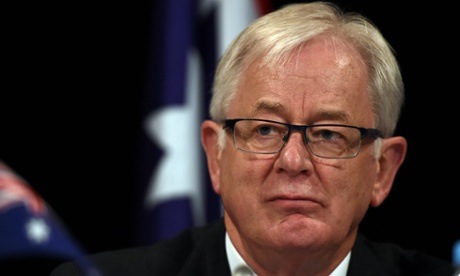
Cabinet minister Andrew Robb has added his voice to backbench calls for the goods and services tax (GST) to be broadened, amid growing signs that the government could take such changes to the next election.
Labor seized on the comments as evidence of the government’s agenda to increase the GST, prompting Tony Abbott to say it would be “a big thing to do” and “the short answer is no”.
The prime minister left the door open to such reform being pursued in a second term of a Coalition government but observed that it would be politically difficult to reach consensus.
Liberal backbenchers Dan Tehan, Dean Smith and Ian Macdonald called this week for the removal of exemptions from the 10% GST.
The Howard government agreed to exempt areas such as fresh food and health and education services in order to win parliamentary support for the GST.
Robb, the trade minister, said the tax white paper process would allow a “mature full-ranging discussion” and the GST would be in “the melting pot”, setting the scene for debate about “what’s taken to the next election”.
“I think there’s a general argument that the broader the base, the better, obviously,” Robb told the Australian Financial Review. “And the lower the personal tax, the better. Whether it’s the GST or a combination of other broad-based taxes.”
The shadow assistant treasurer, Andrew Leigh, said Robb had outed himself “as the ringleader” of the Coalition’s push to increase the GST, showing it went beyond a “guerrilla campaign being run by Liberal MPs”.
Leigh said the cabinet seemed to be putting the issue “first and foremost this year” even though Abbott promised voters before the 2013 election that there would be no changes to the GST.
“Our view is that the Coalition ought to keep its promises,” Leigh said.
“I know that’s an old-fashioned view and I know that after the evidence of the last year you might wonder why on earth anyone should think the Coalition would keep its promises, but that’s certainly the view that the Australian Labor party takes,” he said.
Asked about Robb’s intervention, Abbott played down the prospect of changes to the GST in the short term.
“The short answer is no,” Abbott told 2GB on Friday.
“The GST will not change in this term of parliament and it cannot change in any term of parliament without first of all the support of all the states and territories, including the Labor states and territories, and without effectively a parliamentary consensus. So without a measure of bipartisanship the GST is not going to change.
“Now, lots of people can argue a point about how our tax system might work better, and good luck to them if they want to put that perspective forward.”
Labor has previously disputed Abbott’s argument that all states and territories must agree to any changes.
A parliamentary library research paper says the intergovernmental agreement on federal financial relations indicates that any changes to the GST base or the 10% rate must gain unanimous support of the commonwealth, states and territories.
But the paper cites legal experts as saying the agreement is of a political rather than legally binding nature. This would leave the commonwealth free to “amend the GST legislation unilaterally”. Such a bill would still require passage through both houses of federal parliament.
Separately, Western Australia has called for changes to the way revenue from the GST is distributed to the states and territories.
And the assistant treasurer, Josh Frydenberg, is pushing for the $1,000 threshold for GST on overseas purchases to be reduced, arguing Australian retailers were not on a level playing field with offshore outlets selling items over the internet.
Abbott said the tax white paper process would be focused on achieving “lower, simpler, fairer taxes” because the government supported “lower taxes, not higher taxes”.
Tehan, the Liberal MP for the Victorian seat of Wannon, told Guardian Australian tax reform was critical to maintain the nation’s standard of living and the Coalition had “the political courage, unlike the Labor party, to put it on the agenda through our tax white paper process”.
Labor and welfare groups have argued that expanding the GST would be regressive because low-income families spend more on fresh food as a proportion of their household budget.
But Tehan argued the impact could be addressed through compensation payments to lower-income earners and pensioners.
Treasury’s latest tax expenditures statement shows $6.2bn in forgone revenue last financial year as a result of the food exemption to the GST. The education exemption was quantified as $3.7bn, medical and health services as $3.4bn, and financial services as $3.3bn.
The Australia Institute thinktank has suggested the GST could be extended to include private health insurance and private education without hurting the poor.
